Make your time.
Scott has been plying us with samples, for are we not souls most pliable? My ply is particularly pliable when it comes to super-fresh cakes from outfits with proven track records, such as The Sourcing.
Today, the first four samples in Greek ordering (excluding the late addition of the "beta", kindly added at the last moment by Scott).
I took all of these samples "blinded", and then Scott subsequently revealed the identities of each, afterwards. I sometimes like to force myself to try teas blind, because it strips away the thick layer of prejudice that otherwise introduces sclerotic-like sessions. If the teas are from a wide range of locations, this can be most instructive.
Let's start at the top, with a tea that has rapidly become known as "theetsy weetsy", a.k.a. the "theta" sample.
Let's start at the top, with a tea that has rapidly become known as "theetsy weetsy", a.k.a. the "theta" sample.
This sample looks and smells like Yiwu tea to me. It is super-orthodox in its grape-like fruitiness, that piles out of the sample packet and threatens to overwhelm my unprepared schnozzle. There are fewer tips, and more huangpian [yellow flakes, usually discarded before pressing] than a lot of Yiwu cakes.
As with many of Scott's cake, it separates well into its constituent leaves (pictured above). The initial Yiwu grapes of the dry leaves are present in the wenxiangbei [aroma cup], and which then translate directly into its character in the mouth. There is a solid base of Yiwu straw and a decent finish.
I found it to have a decently thick body, and was vibrant in its sensation. I wrote "This is good-quality, straightforward pu'ercha in the yellow-and-sweet Yiwu genre." After many infusions, it settles down into a low "cough lozenge" sweetness, which is both stable and pleasant. I noted its consistency between brews.
I found it to have a decently thick body, and was vibrant in its sensation. I wrote "This is good-quality, straightforward pu'ercha in the yellow-and-sweet Yiwu genre." After many infusions, it settles down into a low "cough lozenge" sweetness, which is both stable and pleasant. I noted its consistency between brews.
Please remember that the purpose of this tea session is not to get stressed about identifying the exact regions from which each tea derives, but rather emphasising the unprejudiced tasting that can occur when we disencumber ourselves of our expectations.
That said, I was all over trying to determine the source of this tea, like the proverbial high-BMI individual on a calorific snack:
That said, I was all over trying to determine the source of this tea, like the proverbial high-BMI individual on a calorific snack:
Scott revealed that this "theta" is in fact the 2013 Xiangming cake from the northern Yiwushan region, which sells for an entirely appropriate $34. That's a good price for a solid little Yiwu cake such as this. The fact that I guessed the general region from the dry leaves left me stomping around the room thrusting my pelvis out in the celebratory stance of a tribal victor, or, at least, a bad Shakespearean actor.
Tucking the pelvis back where nature intended, I was then brought savagely back down to earth by my woeful attempts to guess where "iota" originated.
"These small leaves remind me of Yibang and Xikong", quoth I, like a spoon. They are small indeed, but the rinse looked suspiciously watery.
I wrote that "this is a tea that hides away": it is low and biscuit-like, with a hint of sourness. My first impressions were not favourable. There is a core of fruity sweetness that suggests some sort of "summertime flavour" region, but isn't something that I can guess immediately.
I wrote that "this is a tea that hides away": it is low and biscuit-like, with a hint of sourness. My first impressions were not favourable. There is a core of fruity sweetness that suggests some sort of "summertime flavour" region, but isn't something that I can guess immediately.
It is always wise to forestall judgement, especially on the first infusion - with this reticent little tea, the second and subsequent infusions are much more open. In this case, it opened into a quite strong a and bitter pu'ercha. It is quite sharp and rather tart on the mouth, with the leafy-green feeling of nettles.
So, after my initial guesses at Yibang and Xikong, which seemed plausible due to the fruitiness as well as the leaf size...
...I was then wooed into picking Bulangshan, of all places, primarily due to the fact that it hits like a truck:
Scott revealed that this cake was in fact (sharp in-take of breath, opens golden envelope, camera lingers on the pained-yet-hopeful expressions of various lowlife actors in the audience)... the 2013 Mangfeishan cake, from the Yongde region.
Really?! Perhaps in the fruitiness. I am completely unfamiliar with Yongde tea, it seems.
Hurting like a spanked schoolboy, I set aside my blubbing and turned my attention to the "kappa".
Now fearful for sticking my neck out, lest I make another excrutiating Yongde-related misclassification, I merely noted that this cake was clean and fresh in its scent.
The magic then started to happen. Magic, like the sorceror's apprentice kind of magic, with dancing broomsticks and pointy hats. It really is rather charming.
The magic then started to happen. Magic, like the sorceror's apprentice kind of magic, with dancing broomsticks and pointy hats. It really is rather charming.
This is very yellow; the hue shown above does not really do justice to the dazzling nature of the colour of this tea. I enjoyed its advanced sweetness in the mouth, with the kuwei [good bitterness] of decent leaves. This is a beautifully fresh tea that matches the cool breeze on this hot summer's day. It is as comforting as it is sweet.
The second infusion is hugely sweet, with a thick base that promises much. What is this charming beauty?
The laughter in Scott's e-mail is almost audible, as he reveals that this is the 2013 Wuliangshan cake. I am a rather vocal fan of Scott's Wuliangshan cakes, especially the 2011 version that burned through Scott's shelves so rapidly. Sensors indicate that this massively enjoyable shengpu sells for the offensively low price of $26. What can you get for twenty-six American bucks these days? A slap in the face from a lady of the night? Half a pint of rancid ale? The bargain alarm is sounding, and what a welcome racket it makes.
After the "kappa", I am ready to be underwhelmed. It is a tough act to follow.
"Lambda" has no such intention of letting me off so lightly.
Going straight for my heartstrings, this fragmented little cake with its dark, short leaves instantly bespeak Simao or Lincang, which is, to me, like waving the red flag to the bull. The afore-mentioned deep-fried doughnut at the proverbial fatman. The comic noun to the tragic adjective-noun.
Even the colour of the rinse gives this tea away, like the Adam's apple and large hands on a suspiciously well-built "lady". The hint of brown colour screams Simao. And lo: the husky grain-like sweetness was lain upon them, and in great numbers. And they protested it not.
To say that this chopped-up little number is "superbad" does not really do it justice. It is packed with the caramelised butter of Scott's well-made modern cakes, and has a good filler of kuwei [bitterness] that I appreciate. It is sweet, but dominated by that husky grain that piles into the mouth like a decent Islay scotch.
My diary has "It is reasonably thick and very drinkable - if not quite as outstanding as the 'kappa' of yesterday."
My diary has "It is reasonably thick and very drinkable - if not quite as outstanding as the 'kappa' of yesterday."
I am going "all in" on this one, betting the agricultural small-holding that it is Simao right from the dry leaves, and each infusion thereafter. Scott does not disappoint, revealing that this is the 2013 Fengchun, a mysterious and new blend for 2013 made from not one but four (4!) Simao components.
The pelvises, they are a-thrustin'.
After the first four teas, then, the "kappa" stands head and shoulders above its peers, but that is because I am a complete sucker for Scott's Wuliangshan cakes. I am relieved to learn that I am nothing if not consistent.
It is with great pleasure, as a result, that I hereby award the "kappa" sample the undoubted and unparalleled honour of the coveted "Space Manoeuvres" prize, which you can enjoy from the Youtube link embedded below.
It is with great pleasure, as a result, that I hereby award the "kappa" sample the undoubted and unparalleled honour of the coveted "Space Manoeuvres" prize, which you can enjoy from the Youtube link embedded below.
Over to you, hard drinkers. Lend us your opinions.

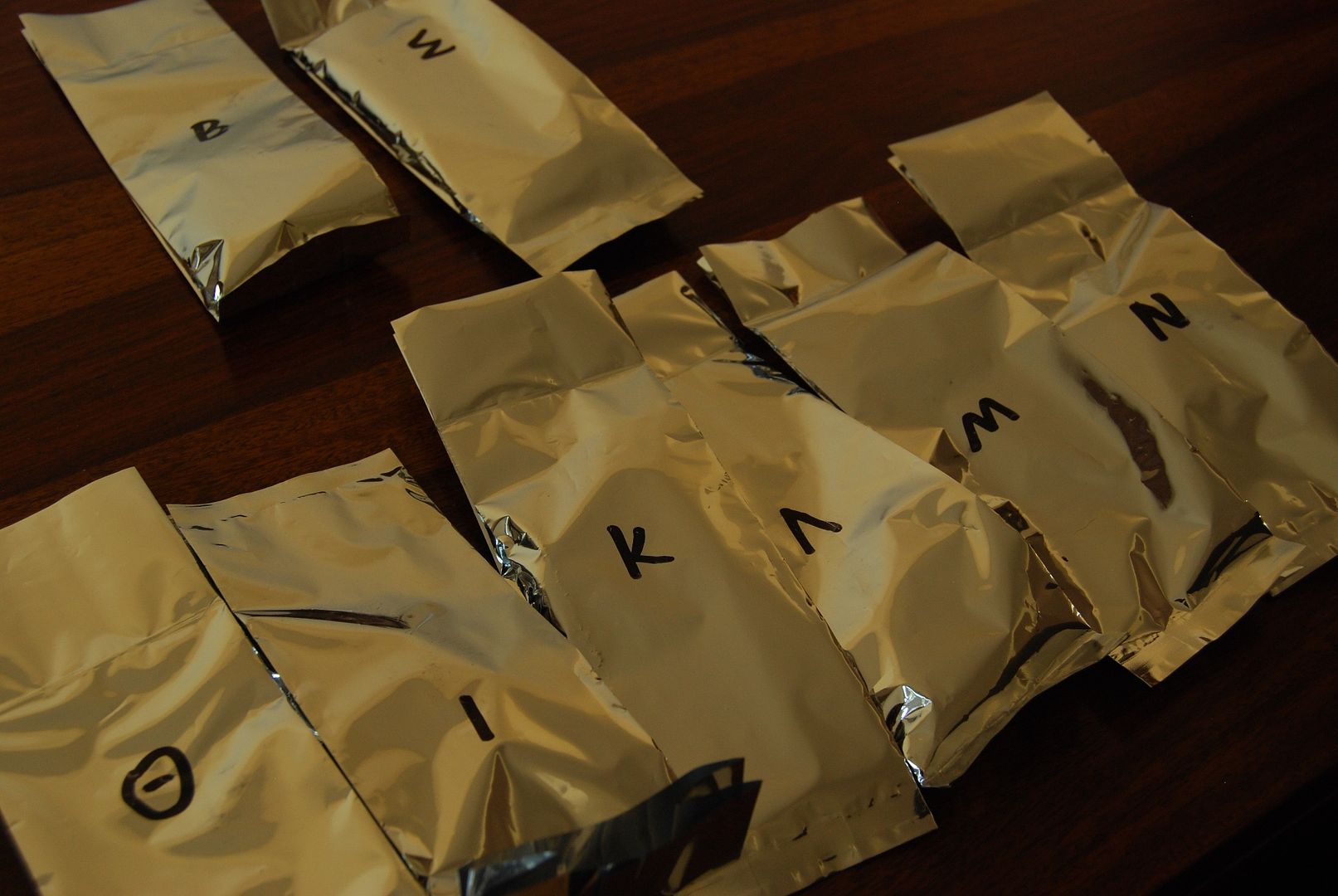
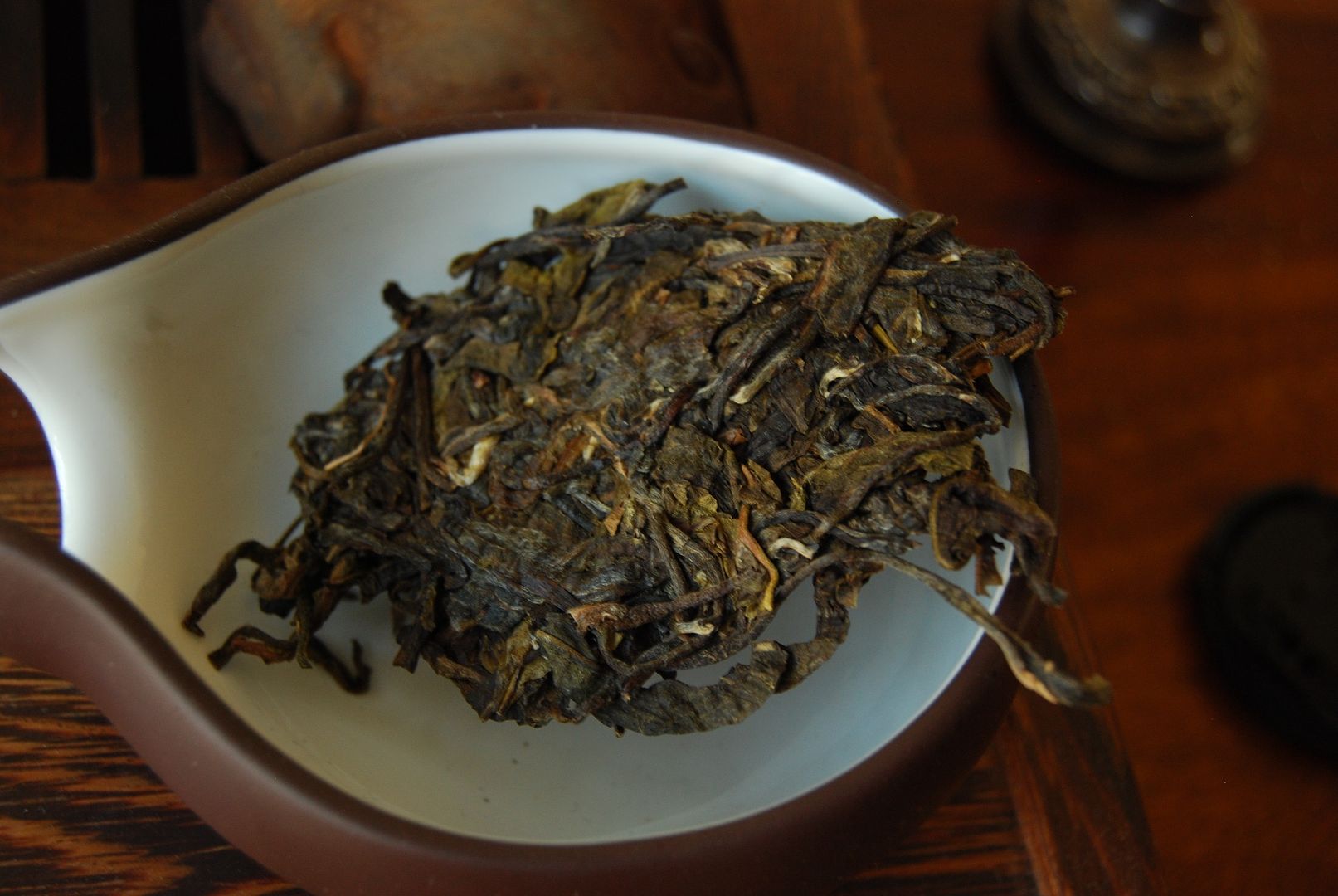

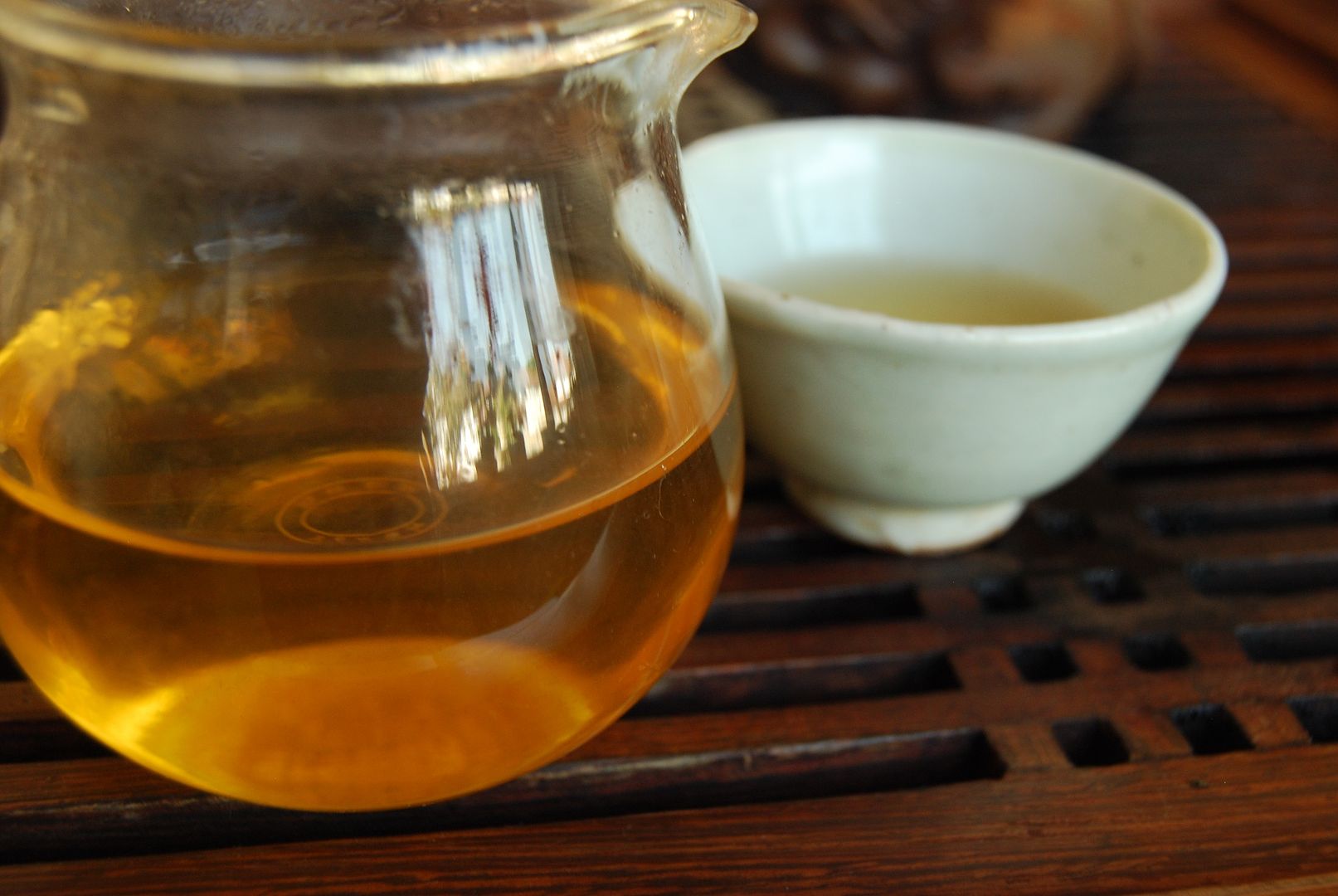
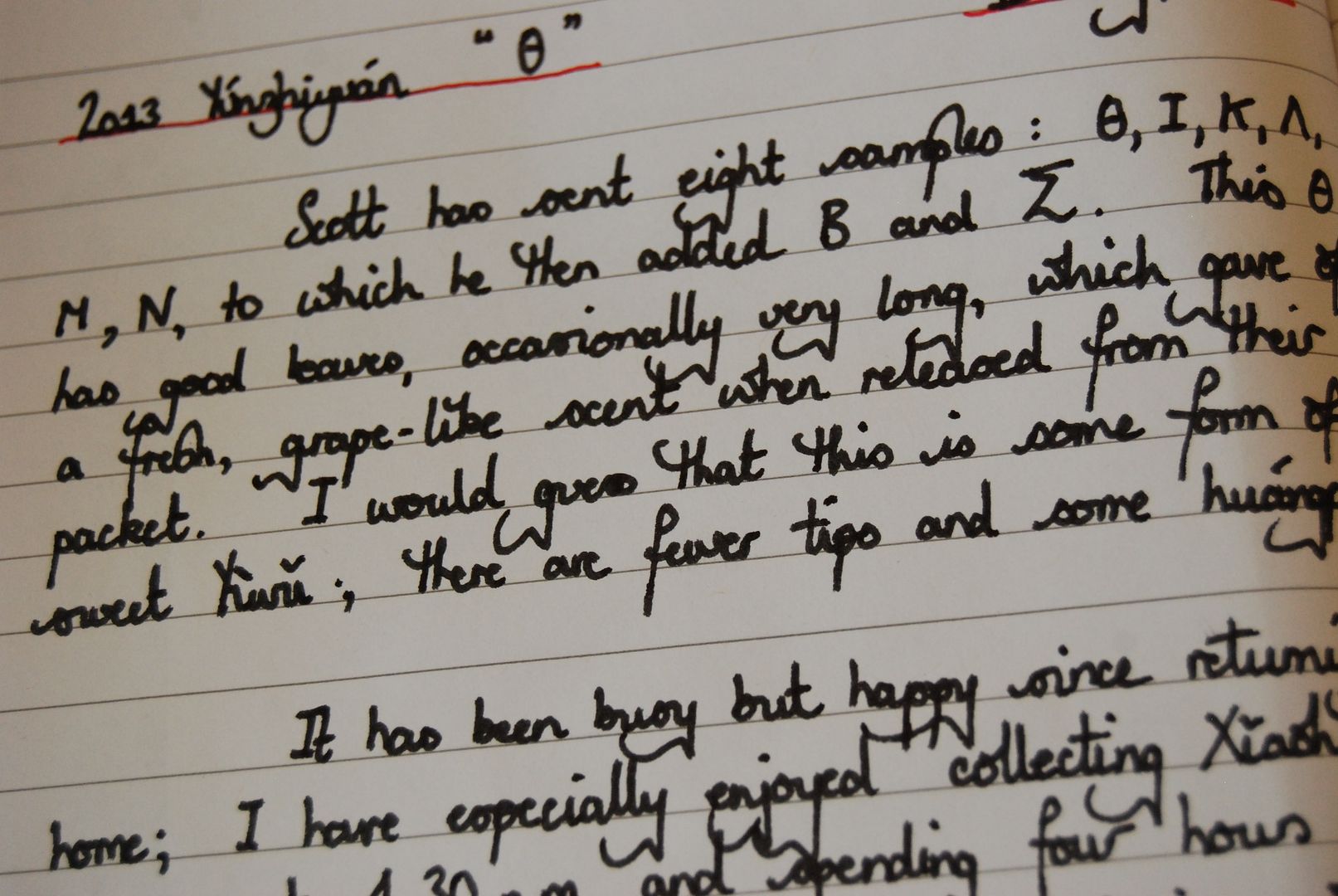
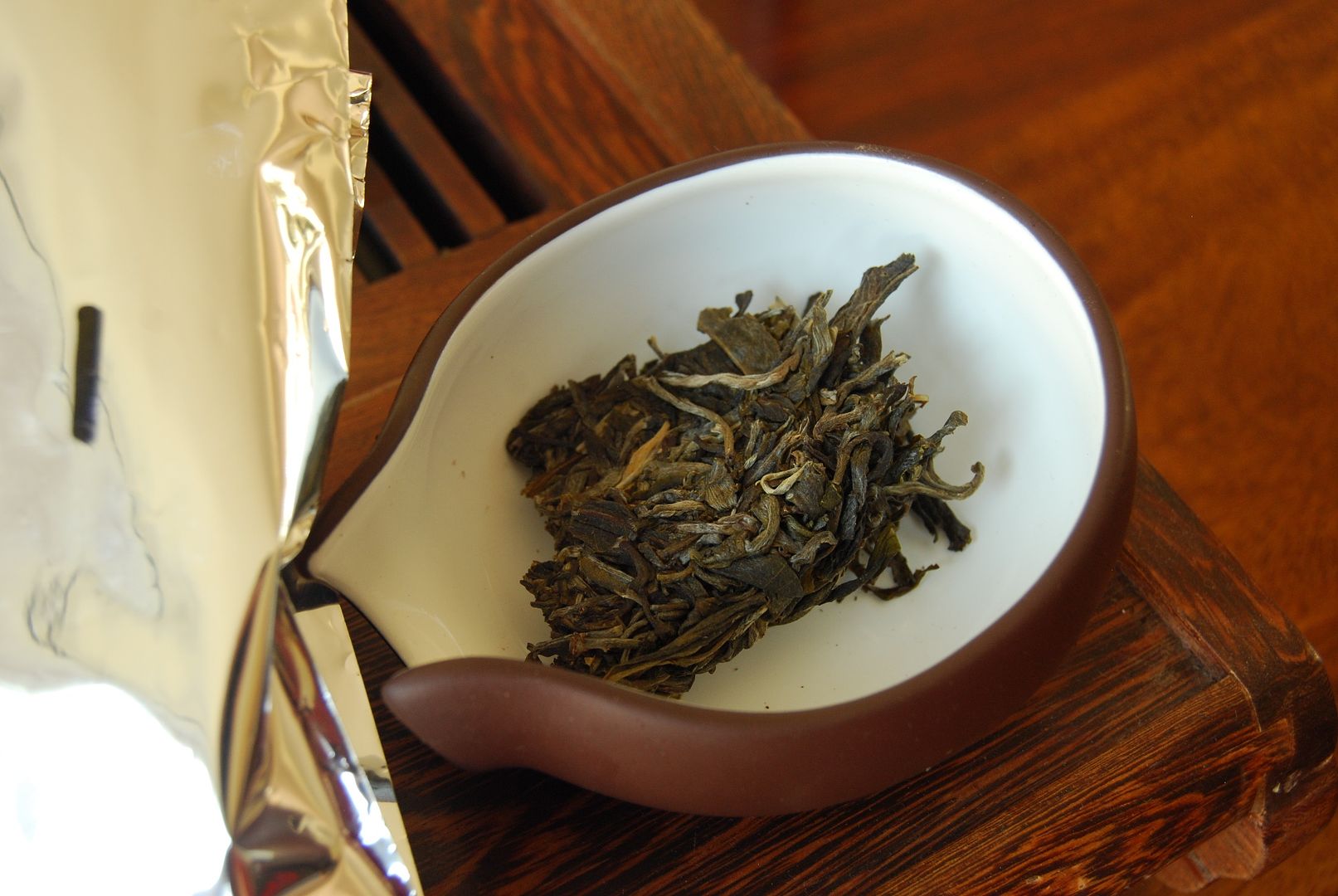
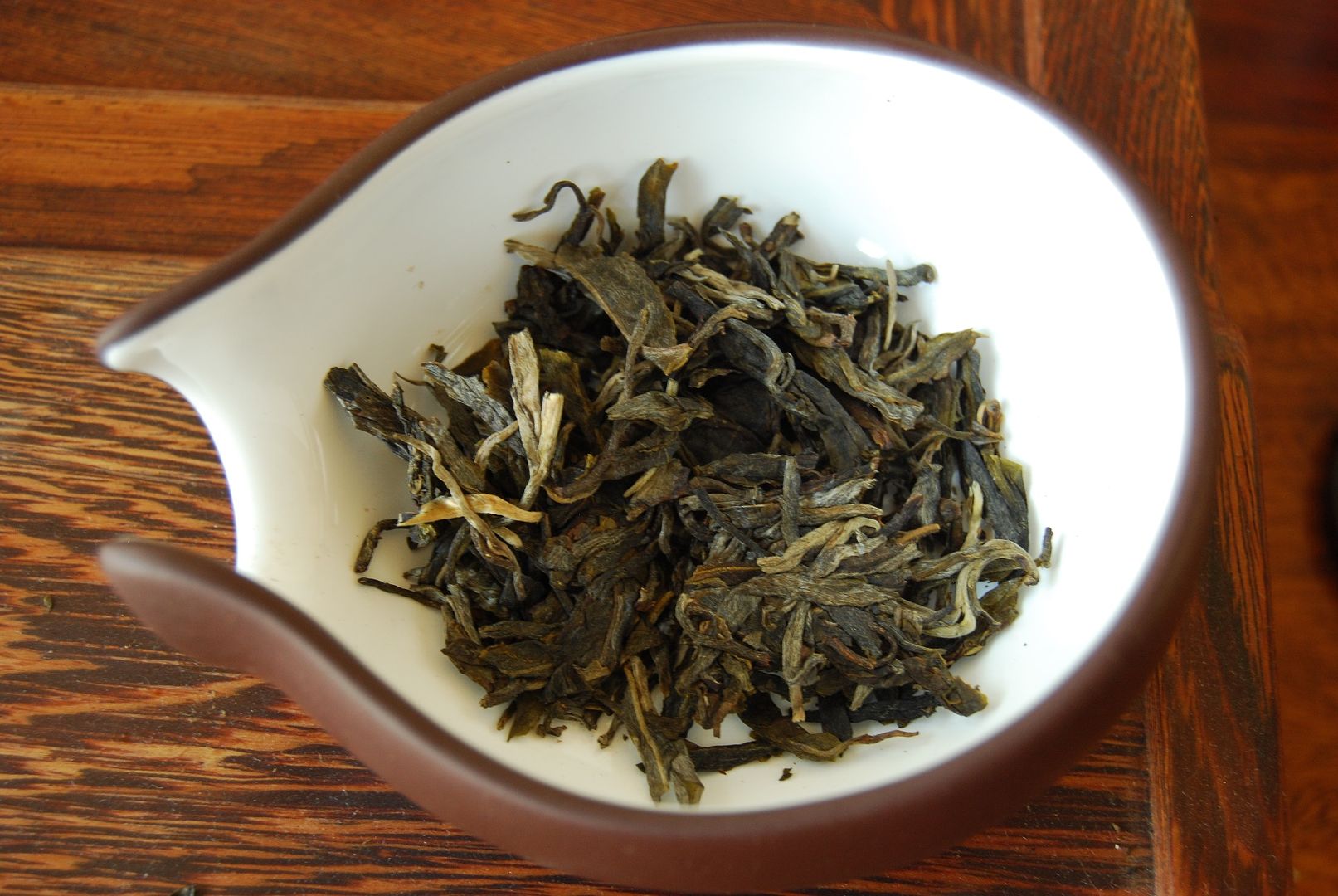
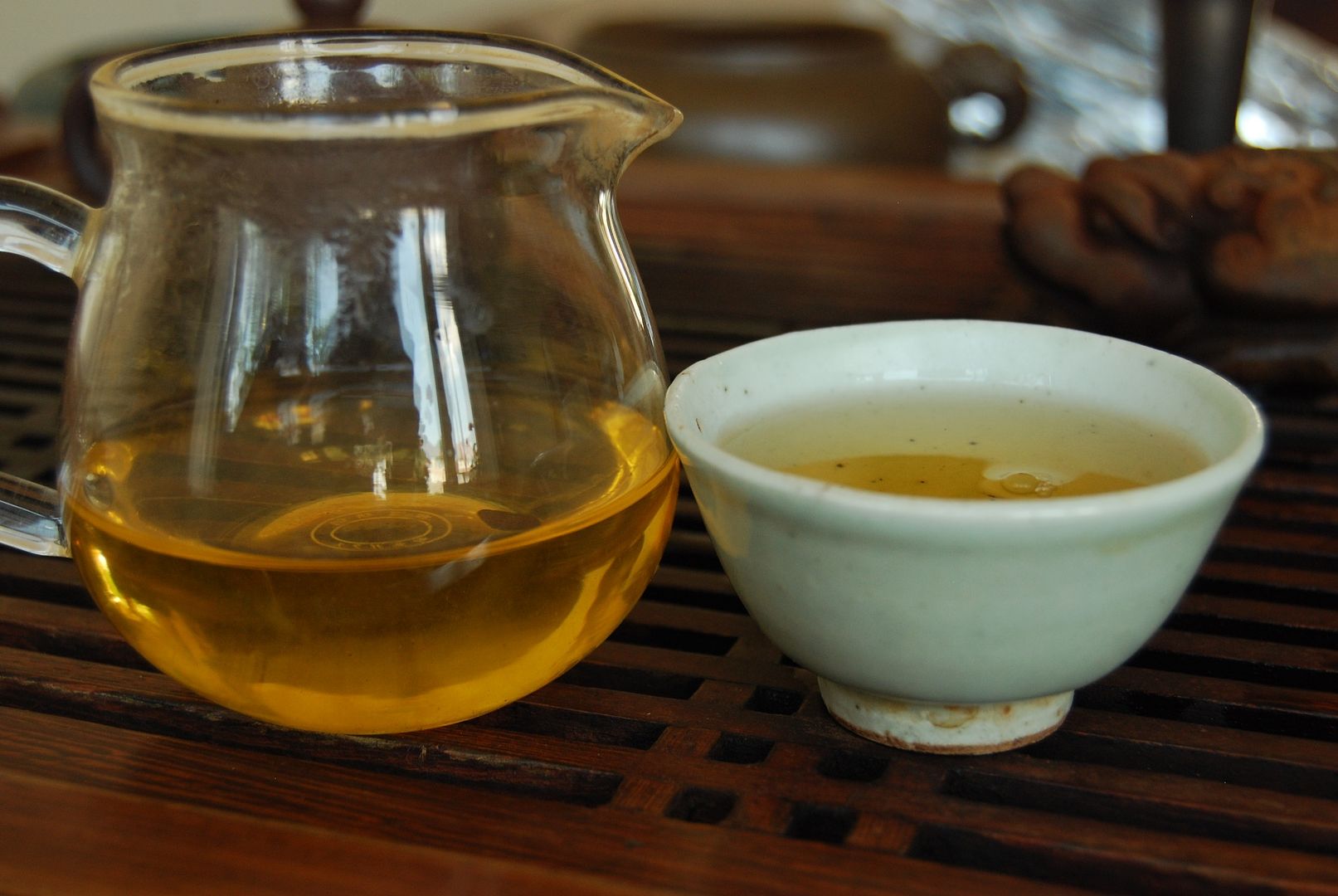
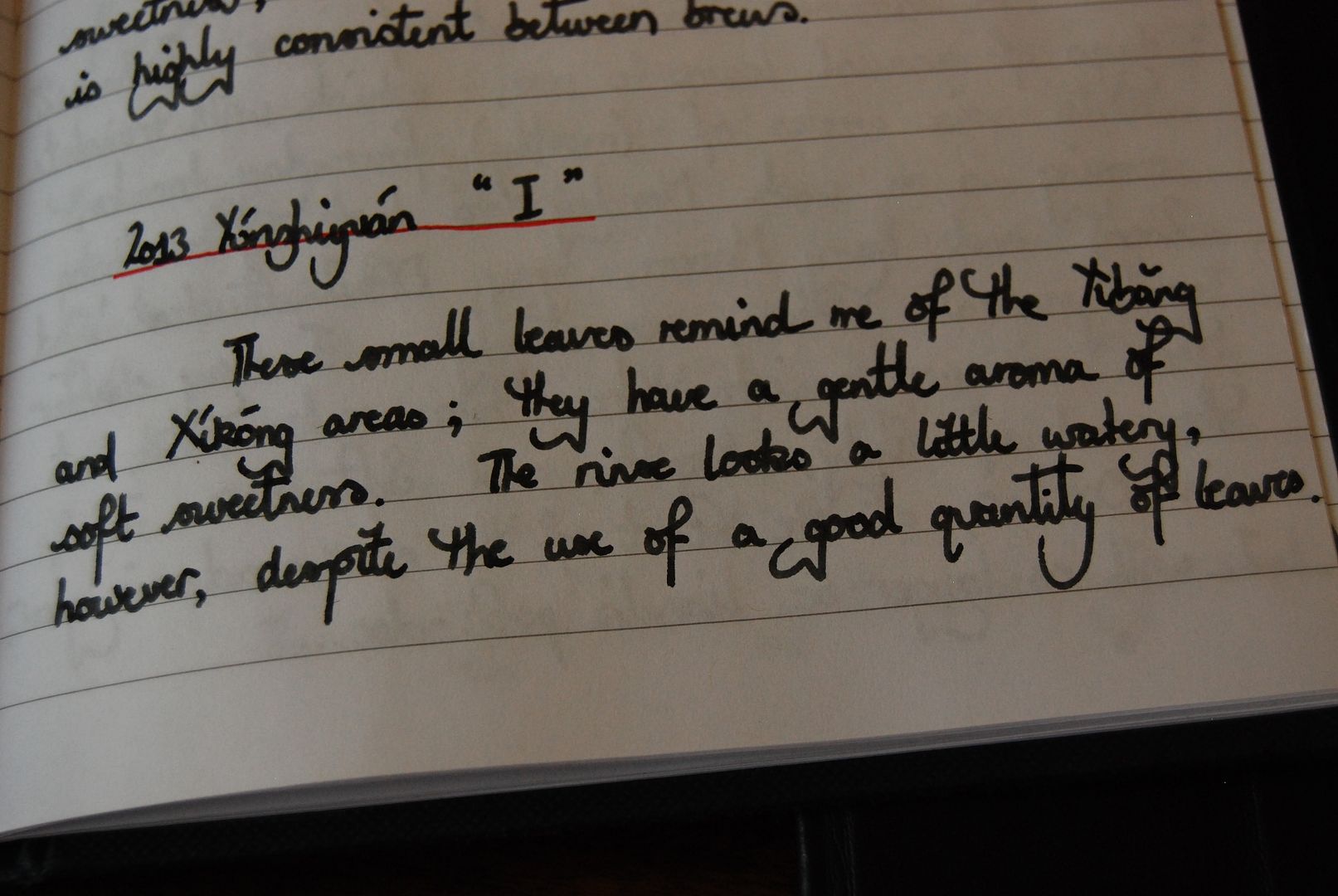
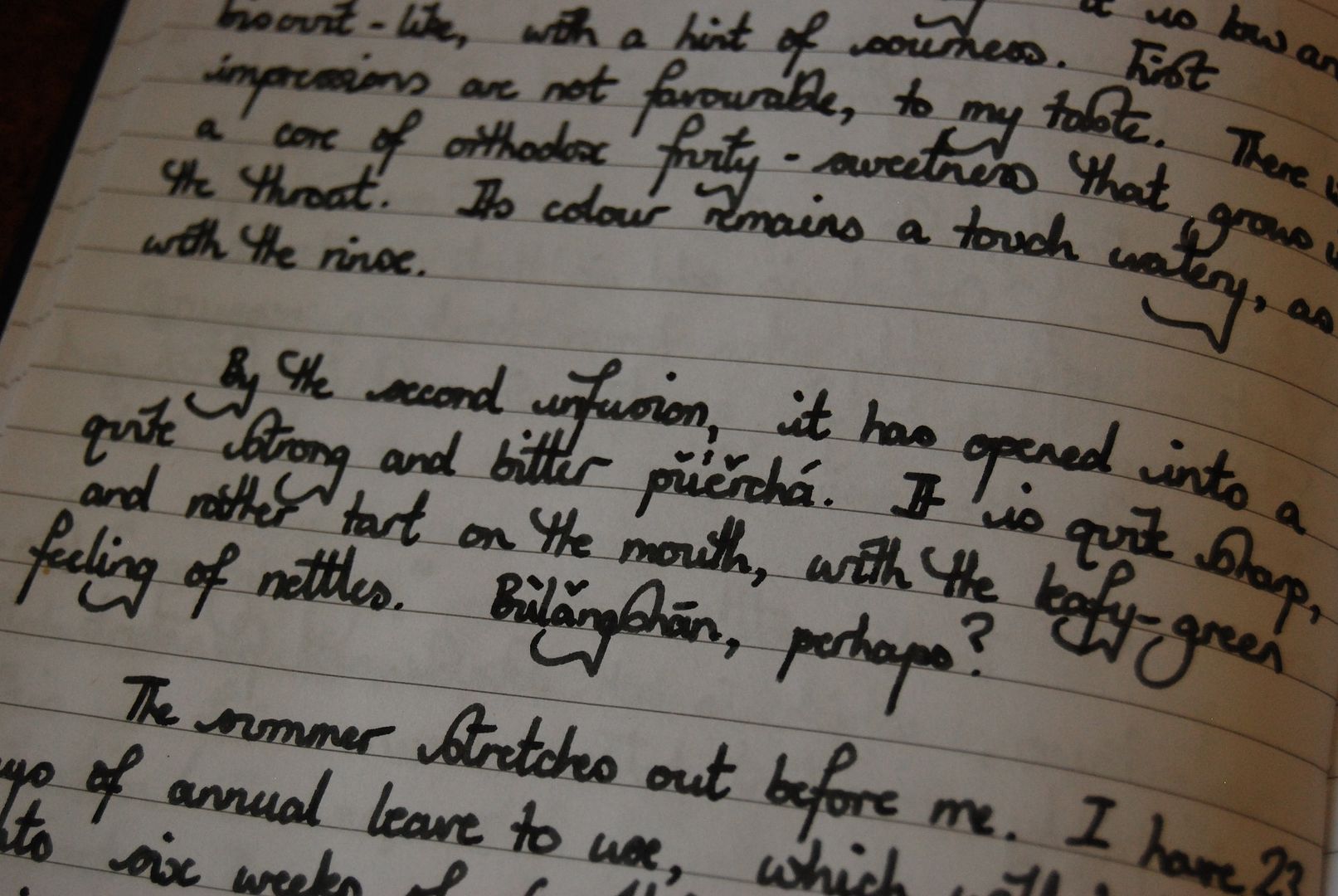
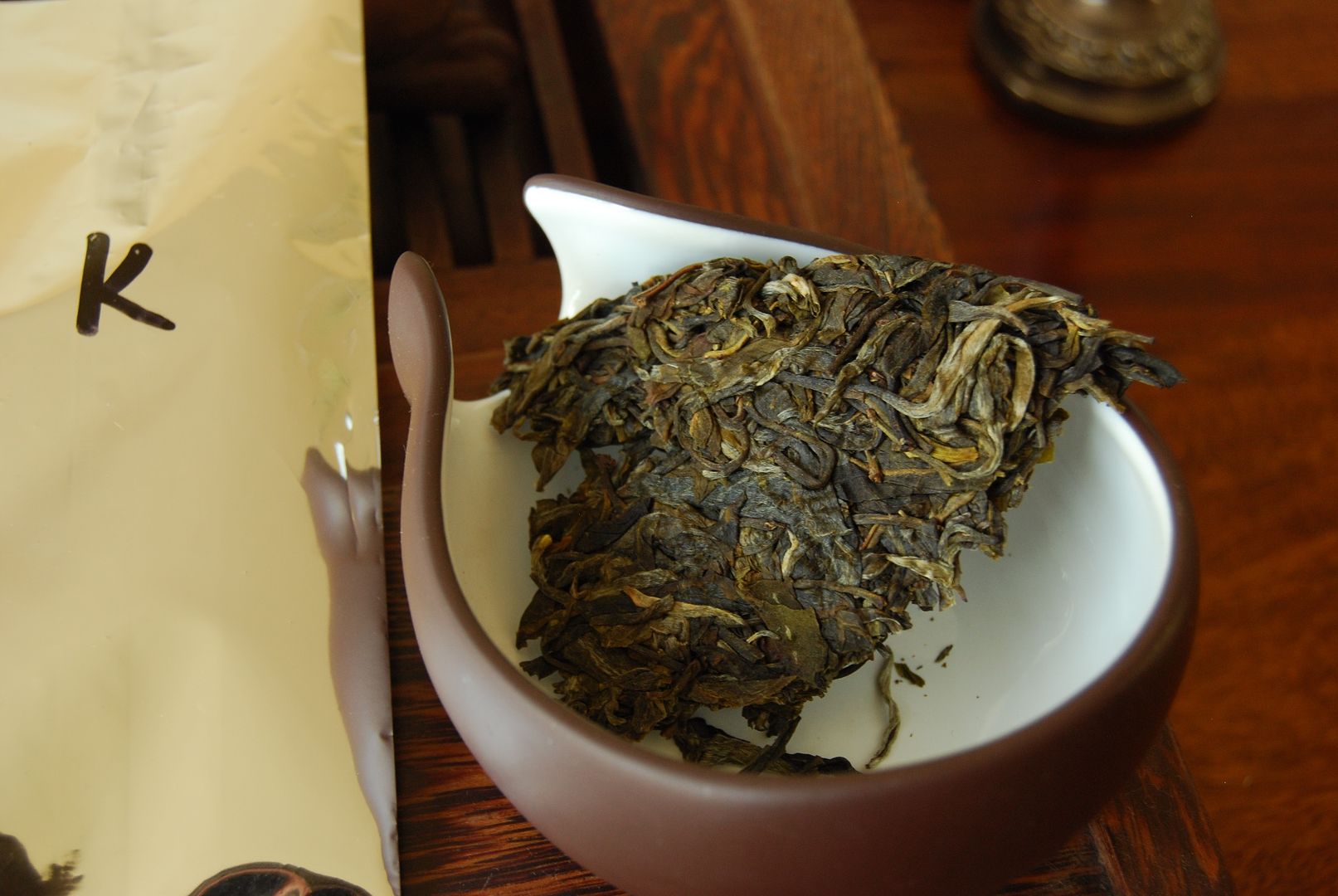

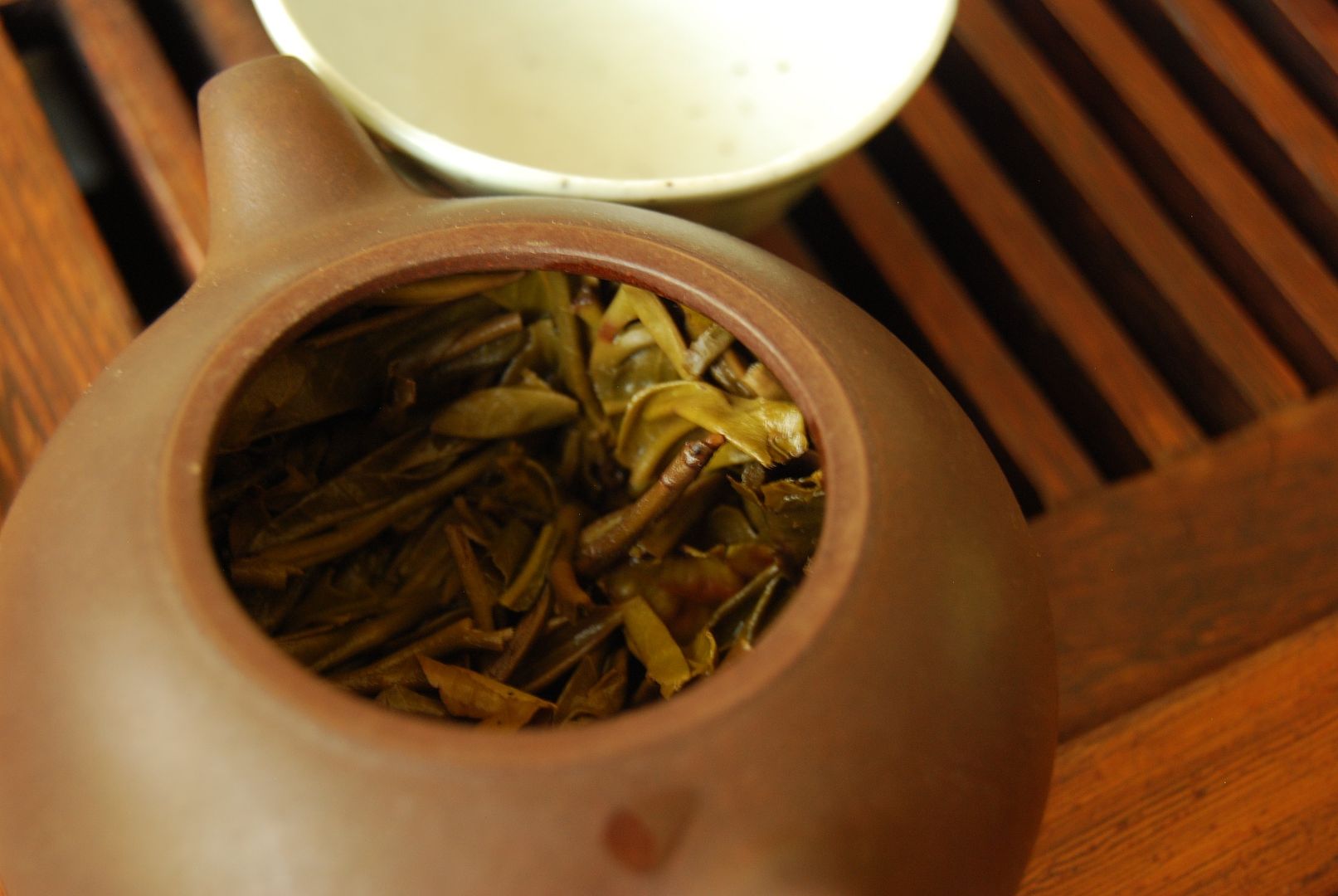

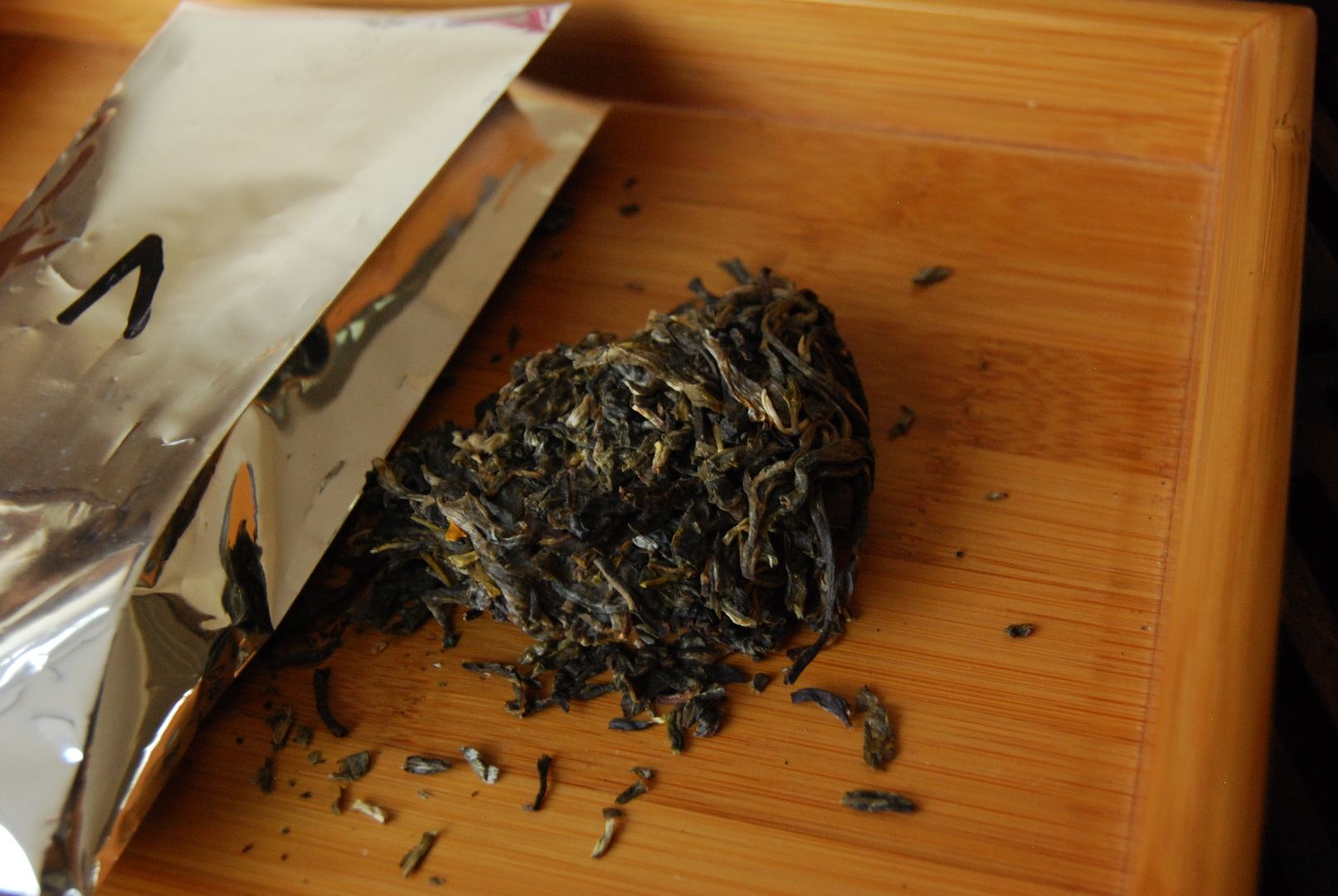
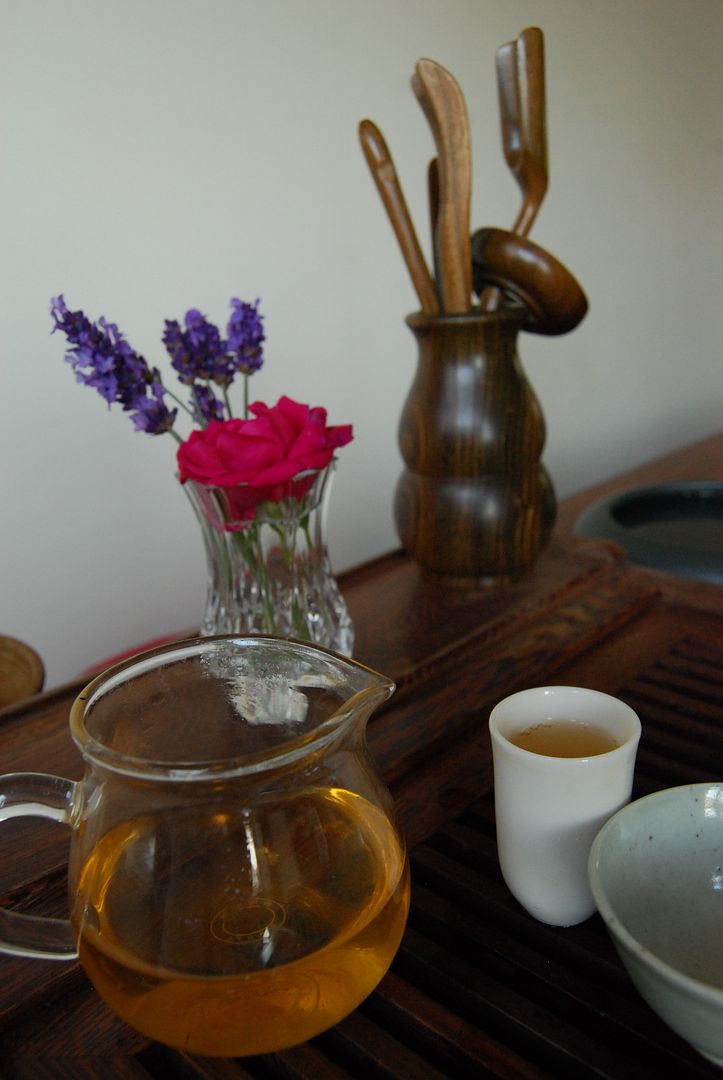

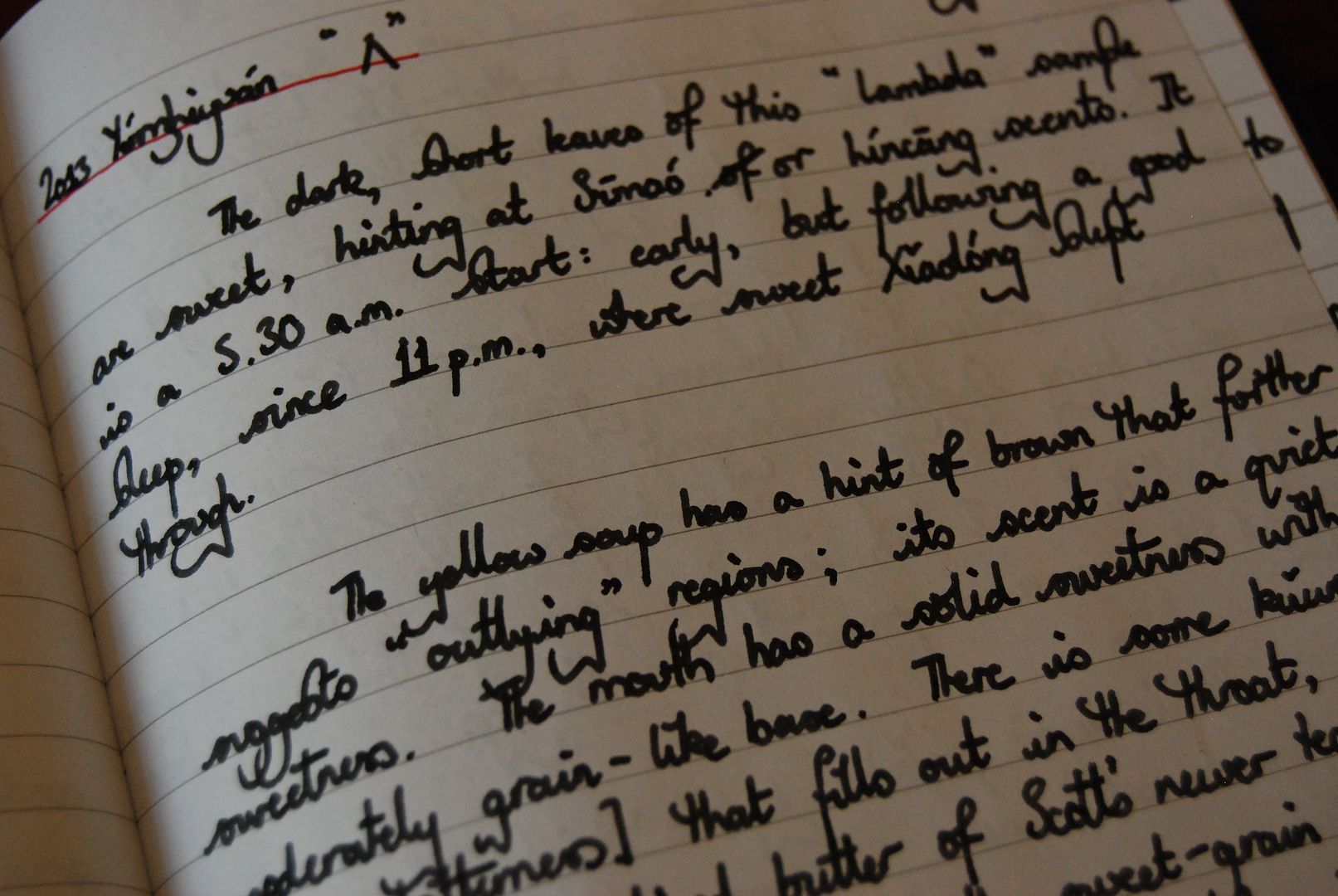
Interesting! Kappa is quite nice for a Wuliang tea, isn't it? The light tobacco in the background should have warned me.
ReplyDeleteInteresting that you squeezed fruitiness out of Iota... I utterly failed at that. I think it is quite good (or common) representative of Mangfei (which I sometimes confuse with Wuliang, unfortunately)... which is not that good representative of Yongde (if there is such a thing, as "representative of Yongde" - the region seems rather confusing and seldom fruitful to me).
Looking forward to the next round of notes!
Jakub
I am deeply unable to tie Yongde down, in my mind. I recall the series of cakes from YS, around 2006 time, when that region was particularly popular, or so it seemed - I didn't really get to grips with them then, either. :)
ReplyDeleteToodlepip,
Hobbes
My comments, as written at tasting, completely unedited, for your enjoyment:
ReplyDeleteTheta: Deliciously sweet hay aroma. Medium-large intact leaves, medium compression. Lightly ashy aroma on pot lid, not much at all in tea aroma. Rather watery, despite a strong-looking yellow soup. Cereal, and a little camphor on the aftertaste. Seems like I should have used more tea, but I used roughly half the sample, just like with the other teas. Nice flavor, aroma, and aftertaste, only very weak.
Iota: Medium-sized green leaves, lots of silver hair on them. Cereal-sweet aroma. Strong-looking yellow soup; ashtray and grain aroma on the pot lid. Grain from the surface of the tea. Rich grain/cereal sweet taste with slightly delayed but powerful ku. Nice “round” mouthfeel with a bit of silkiness. Maybe a hint of camphor in the aftertaste. Quite enjoyable, if not somewhat monotone due to the simplicity of the grain taste with no discernible florals. Not my exact cup of tea, but I might buy it anyway if not too pricey just for what it is.
Kappa: Grass-vegetal aroma out of the bag, green, medium-sized leaves. My initial impression is that this is young, maybe last year’s (2012) production. The yellow soup is just barely going over to amber, so maybe it’s a year or two older. An interesting mix of ash and floral aromas under the lid, like sitting in a funeral parlor next to an ashtray, but I don’t mean that in a bad way. Serious Ku greets the front of the mouth, but it is not in the least bit rough. There is a refinement to this tea, and a gentle strength. The flavors are simple and vegetal, reminding me that sheng is, after all, technically a green tea. The aromas and the action of the ku, and the caffeine, quite strong and heady, tell me this will age into something even more interesting. I would buy this one.
Lambda: Sweet and grassy aroma out of the bag. Medium-sized intact leaves, medium compression. Floral aroma under the pot lid, not much of anything in the vapor rising off the tea. There is camphor, but no ku to speak of. The camphor lingers and fills the mouth. That’s about all, though. Like yesterday’s Theta, this tea has one component I look for in a good shengpu, and nothing objectionable, but it seems to have big holes in the taste profile. Not unpleasant, but definitely missing something.
Very good - thank you, ma'am. :)
ReplyDeleteI trust that you enjoyed the mystery!
Toodlepip,
Hobbes
Hobbes, this doesn't have to do with your post but I had a question. Can you estimate how many kilos of sheng puerh you have, how much you spent on that, and how long it took you to acquire that much?
ReplyDeleteI love your comment:
ReplyDelete"stomping around the room thrusting my pelvis out in the celebratory stance of a tribal victor"
Perhaps listening to Eye of the Tiger got you in the mood for all that pelvic thrusting. God that song is badass... I remember being about 7 or 8 years old when that song came out... After I saw Rocky 3 my brother and I would dance around shadow boxing to that music endlessly.
Here are my 2 humble cents on the great samples, unedited. All brewed with 10g of leaves in a 100ml+ Zini teapot.
ReplyDeleteTheta: Pretty mild tea. Thin mouthfeel, fast but short huigan. Little to no bitterness and lanxiang sweetness. A bit uninteresting.
Iota: As a fan of Islay whiskies (think Laphroaig Quarter Cask, Ardbeg etc ), this is too smokey even for me to bear. Mouthfeel is slightly thicker than water. The bitterness is overwhelming, maybe 10g is too much for this particular sample. Little to no sweetness detected, or maybe my tastebuds are no longer functioning from the initial shock.
Lambda: Not very bitter but has enough of a kick to it. Fast and long huigan, with initial lanxiang taste giving way to fruity flavors and sweetness. Reminiscent of Phoenix Dancong. Slightly viscous mouthfeel. The fruity taste gives way quickly though.
Kappa: If I was blindfolded and given a whiff of the dry leaves from the bag, I would have guessed it as a Phoenix Dancong. Wet leaves however smells of granary sweetness. Initial taste of earthy/mushroomy sweetness with just the right bit of kuwei to keep it interesting. Nice long huigan that comes in after a short while which tastes like cereal sweetness with a hint of lanxiang at the back. This has got to be my favourite tea of the first bunch of samples discussed. Only thing I feel is lacking is the mouthfeel, if only it was thicker~.
Once again thank you Hobbes for this great opportunity for samples tasting!
Blessings,
Elvin
Dear Ted,
ReplyDeleteI can answer your question in more detail than you could ever require, because I keep detailed electronic notes of my purchases, in tabular form. I am, after all, something between engineering and statistics. :)
I have 705 cakes / tuocha, which weigh a total of 212 kg. These have been bought during the period 2004 - present, and where I will spare you the total expenditure because it is entirely terrifying. :)
Toodlepip,
Hobbes
Dear Scott,
ReplyDeleteI was a toddler, apparently, when Eye of the Tiger was released, but came to know about it from watching re-runs of Rocky. :)
Dear Elvin,
Thank you for posting your notes! It is fascinating to compare.
Best wishes both,
Hobbes
Sorry I'm a little late ... :D
ReplyDeleteI decided to brew all samples in a small, porcelain gaiwan and used 5.5g to ~75-80mls water for each sample.
Impressions (shortened notes):
Theta - some slight graininess, citrusy, sweet, slight lychee or sweet fruity scent; decent mouthfeel, very minimal huigan, some bitterness
Iota - wet leaf aroma of roasted vegetables and something else (couldn't quite put my finger on it), also a peanutty scent; decent mouthfeel, possible huigan (not very discernible to me), bitterness builds with infusions, some slight smokiness; lasting bitterness
Kappa - unique wet leaf aroma (possibly mushroom?), sweet grains; initial brews light without any bitterness, slight fruit flavor; activity deep in the throat (slightly cooling or numbing sensation); not a very heavy tea and light throughout brews, but very nice throat activity
Lambda - strong wet leaf aroma, pleasant, roasted grains and vegetables, peanutty aroma with subsequent brews; bitterness throughout brews, okay mouthfeel/thickenss in mouth, lasting huigan in back of mouth (active feeling), bitter but smooth; later brews scent of citrus or vinegar (sweetness like fermentation), ending with continued bitterness and the scent of fresh cut pears
Thanks for the tasting opportunity Scott and David! Really enjoyed Kappa and Lambda so far, though all of these teas are interesting in one way or another and this has been (and will continue to be) quite the learning experience. Thank you.
Thank you for the notes, tst - interesting stuff.
ReplyDeleteToodlepip,
Hobbes